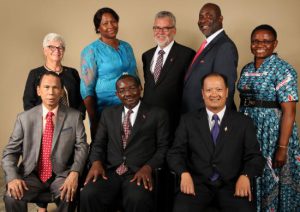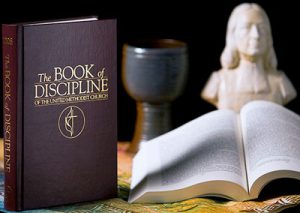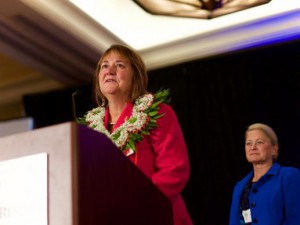 The United Methodist Church’s Judicial Council, essentially its Supreme Court, will hear oral arguments on Tuesday morning, April 25, 2017, regarding the legality of the Western Jurisdictional Conference’s election of an openly lesbian and married clergywoman to be a bishop in the church. After deliberations, the Council will share its decision with the general church several days later.
The United Methodist Church’s Judicial Council, essentially its Supreme Court, will hear oral arguments on Tuesday morning, April 25, 2017, regarding the legality of the Western Jurisdictional Conference’s election of an openly lesbian and married clergywoman to be a bishop in the church. After deliberations, the Council will share its decision with the general church several days later.
What is the nature of the case before the UM Church’s “Supreme Court”?
On Friday, July 16, 2016, delegates at the UM Church’s Western Jurisdictional Conference elected the Rev. Karen Oliveto, an openly lesbian clergywoman in a same-sex marriage, to be a bishop in the church. She was consecrated by other bishops and then assigned to serve as the leader of the Mountain Sky Episcopal Area (an area encompassing the states of Colorado, Montana, Utah, Wyoming, and parts of Idaho).
Since the UM Church defines marriage as between one man and one woman, requires its clergy to either exhibit “fidelity in heterosexual marriage” or “celibacy in singleness,” and finds the “practice of homosexuality to be incompatible with Christian teaching,” the Judicial Council (the Church’s “Supreme Court”) is being asked whether it was legal for the jurisdictional delegates to nominate, elect, consecrate, and assign Oliveto as a bishop of an episcopal area.
To be clear, the case is about the legality of the actions of those who elected, consecrated, and assigned Oliveto to her episcopal office. The Judicial Council is not being asked to render decisions about the church’s sexual ethics, its teachings on marriage, or its ordination standards. Furthermore, it will render no decision regarding Oliveto’s ministerial credentials.
(To read Good News’ analysis of the leading legal briefs filed in the case, click HERE.)
How do people become members of the Judicial Council, and how many people serve on it?
Laity and clergy are nominated by bishops and General Conference delegates to serve on the Council. Every four years they are elected or re-elected by the General Conference delegates. Nine members serve on the Council and, unlike U.S. Supreme Court justices, they have term limits. To read about the current Council members click HERE.
Ordinarily, the Council does not hear oral arguments, why is it doing so in this case?
At its discretion, the Council can decide to hear oral arguments. It typically does so when a particular case’s outcome will have major ramifications for the whole church.
What are the most likely decisions the Judicial Council could reach in this case?
There are only two likely decisions.

The Council could decide that since Oliveto was at her election and assignment in a same-sex marriage (and still is), she was not an eligible episcopal candidate, therefore, her election and assignment were invalid. Just as the Judicial Council has overruled other acts of non-conformity recently emanating from defiant annual and jurisdictional conferences, it could decide the Western Jurisdictional Conference was knowingly engaging in an act of ecclesial disobedience when it wittingly elected, consecrated, and appointed a person widely known to have defied church teaching with regard to same-sex marriage.
Alternatively, the Council could hold that since Oliveto was a clergy member in “good standing” at the time she was nominated, elected, consecrated, and assigned as a bishop, she is entitled to serve as such. That is, even though it was widely known she had presided at same-sex weddings and was in a same-sex marriage herself, none of the boards of ordained ministry, district superintendents, or bishops who had oversight of her ministry ever filed a complaint against her, and therefore she was never found to be in violation of the church’s ordination standards.
In the case of the latter decision, Oliveto could be charged in a separate action with violating UM Church law by marrying a same gendered person herself, and for presiding at same-sex weddings (she has admitted to presiding at approximately 50 such ceremonies). If someone were to bring charges against her for either of those offenses, the UM Church has a process for charging a clergy member for violating its ordination standards, and trying him or her if necessary. According to church law, every clergy member is guaranteed the right to a trial and appeal. Any complaints against Oliveto would be handled by the Western Jurisdiction’s College of Bishops (composed of active and retired bishops in the jurisdiction). The complaints could be resolved or referred for a church trial under the supervision of the president of the Western Jurisdiction’s College of Bishops.
If the Judicial Council upholds Oliveto’s election, the Council would essentially be remanding the case to the Western Jurisdiction so the complaint process could be followed. The Council could reserve the right to review any outcome in the event of a just resolution or a verdict in a trial.
If the Council rules to invalidate the election and assignment of Bishop Oliveto, what would happen next?

Rev. Karen Oliveto accepting her election, UMNS
She would have to vacate her office and the Western Jurisdiction Episcopal Committee would then select an interim bishop to preside over the Mountain Sky Episcopal Area until a new election could be held. Oliveto would remain a clergy person in the UM Church and be entitled to an appointment. Any complaints filed against her would have to be handled according to procedures outlined in the Church’s Book of Discipline.
If the Council rules that Bishop Oliveto’s election was valid, what would happen?
She would remain as the bishop of the Mountain Sky Episcopal Area. Any complaints filed against her (and reportedly complaints were filed in August 2016) would be handled according to the Discipline. A variety of things can happen with a complaint. In an effort to avoid a church trial, the church would first work to reach a “just resolution.” Among other possibilities, such a resolution could leave Oliveto in place as a bishop or alternatively lead to her voluntary resignation. If no just resolution is reached, Oliveto could face a church trial. If she were found guilty, she could be removed from office and lose her ministerial credentials. However, she could also reach some agreement (e.g., involving admission of fault and a demonstrated willingness to abide by the Discipline) that would allow her to retain her credentials and office.
If Oliveto’s election and assignment is upheld, would this mean the UM Church has changed its sexual ethics, teachings on marriage, and standards for ordination?
No. The Judicial Council is not being asked to rule on the validity of the church’s sexual ethics, teachings on marriage, or requirements for ordination. They would all remain in force regardless of any decision in this particular case.
Where does Good News stand on this matter?
Good News believes our church’s sexual ethics, teachings on marriage, and standards for ordained ministry are rooted in Scripture, confirmed by nearly 2,000 years of church tradition, and endorsed by the vast majority of Christian denominations worldwide. Furthermore, our General Conference, composed of a global and diverse body of United Methodists, has affirmed and reaffirmed its decisions on these matters for the past 45 years. Based on the evidence presented, we believe the Judicial Council should invalidate the Western Jurisdictional Conference’s nomination, election, consecration, and assignment of Bishop Karen Oliveto. For the sake of the church’s principled teachings, its good order, and its future health and viability, we believe it is imperative for the Council to stem the rampant acts of ecclesial disobedience that are undermining our church’s mission.






0 Comments